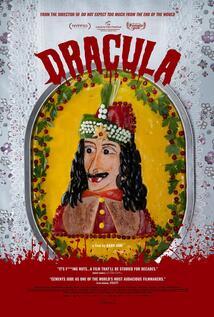

I don't need to bore readers of my blog or my letterboxd account with all the reasons I think Bram Stoker's immortal gothic horror novel Dracula, while seemingly cinematic with its mysterious atmosphere, timeless themes, and sexulaly charged OG vampire, is one of the least translatable books to the silver screen (you can read my reviews of any other Dracula adapation for that), but I did enjoy this non-adapation of legend by Romania's own cinematic hooligan Radu Jude (Do Not Expect Too Much from the End of the World). The film is less a cinematic exploration of Transylvania's most famous character and the effect his legacy has had on his fellow Romanians, and more a gleeful exploration of how contemporary culture has been sucked dry by a far more powerful vampire—capitalism.
At the center of this 170-minute anthology of stories centered loosely on Dracula is a young, brash filmmaker (Adonis Tanța) who is tasked with creating a new take on a vampire movie. When the results test poorly, he asks a Transylvanian generative AI to rewrite the film for him. Thus, Jude is able to delight in the crude narrative chaos, inartful digital slop that reflects the current state of Artificial Intelligence. It's the ideal aesthetic for this filmmaker's unique combination of sophistication and vulgarity. Viewing AI as nothing more than the inevitable next step for a culture that, for at least the last century, has been cannibalizing itself through opportunistic cash-grabs and the exploitation of intellectual and artistic resources as much as natural ones, the movie, set in present-day Transylvania, unfolds in 14 chapters of varying lengths. Most are funny, but none rise to anything of real substance. This picture is only interesting for its cumulative effects. It's a critique of the passive audiences sitting through this assault on our senses.
The fact that the film only succeeds as a test of wills renders it far less powerful, meaningful, and potentially timeless than Jude's prior lengthy, episodic, crude but undeniably sharp and introspective film, Do Not Expect Too Much from the End of the World, which, I have little doubt, will be viewed in the future as Jude's masterpiece. Dracula is a film essay rather than a profound work of cinema. Therefore, I'm glad Jude released the more straightforward yet still very "on-brand" Kontinental '25 the same year (a year that coincidentally also saw the release of Richard Linklater's Nouvelle Vague, a love letter to the French New Wave enfant terrible Jean-Luc Godard, whom Jude seems the most worthy heir apparent). While I can't claim Dracula is an important film to see, I do think it's far more than an interesting curiosity.
Romania's cinematic hooligan Radu Jude's take on his nation's most iconic character is far less about the literary legacy of Vlad the Impaler than about how capitalism, fascism, and other isms suck the life out of their respective cultures far more effectively than any vampire ever could.




